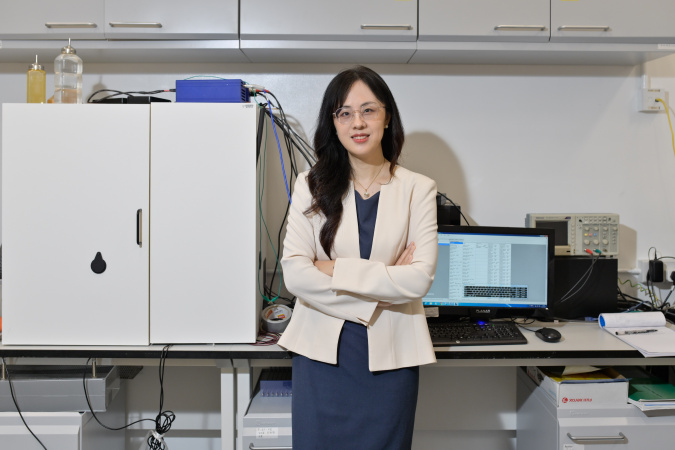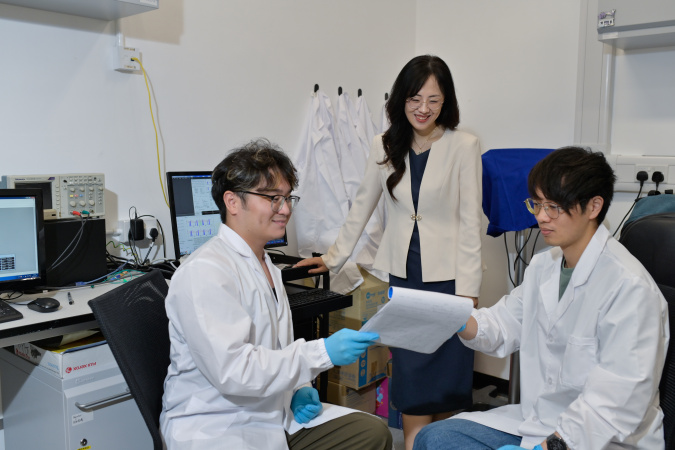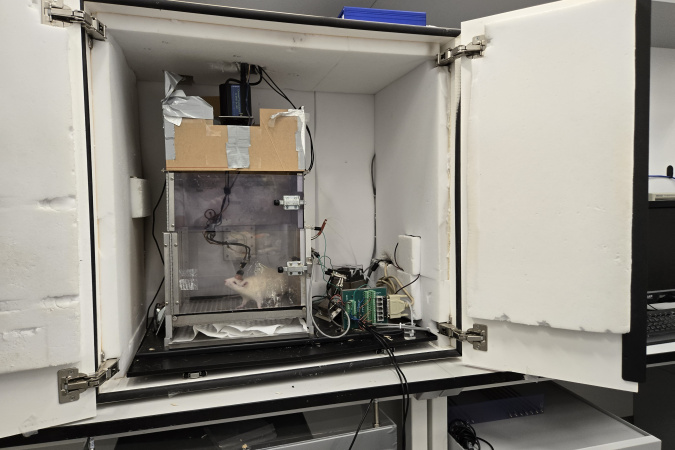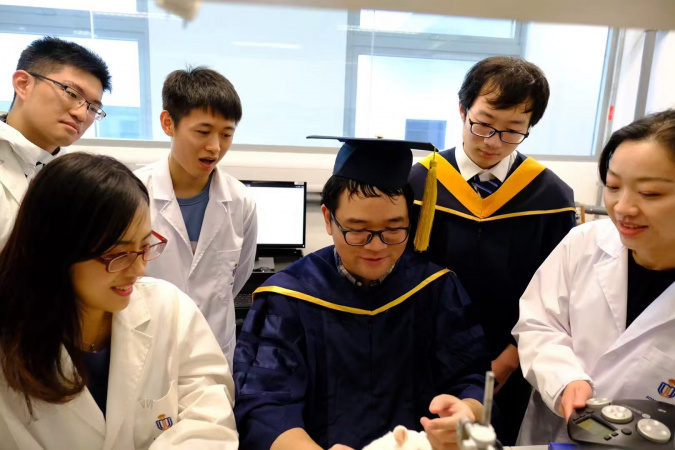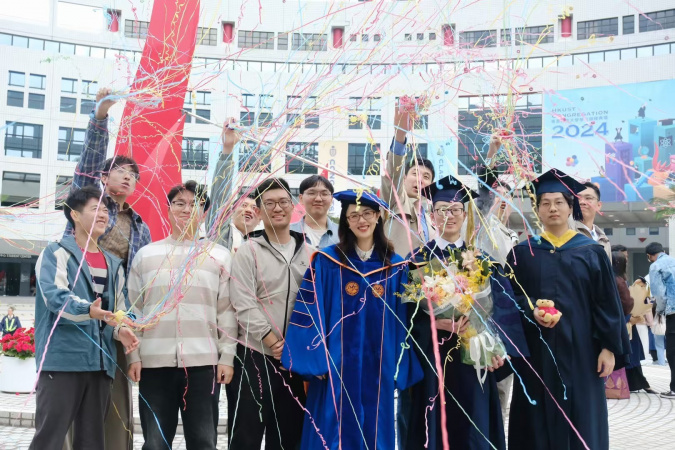Neural Engineer Prof. WANG Yiwen Drives Impactful Brain-Machine Interface Research for the Disabled
Prof. WANG Yiwen, Associate Professor in the Department of Electronic and Computer Engineering (ECE) and Department of Chemical and Biological Engineering (CBE) at HKUST, develops brain-machine interfaces that restore motor function to paralyzed patients. Her journey from dismantling bicycles to pioneering neural engineering reveals how curiosity, resilience, and mentorship can literally transform lives.
The making of an engineer
Prof. Wang entered primary school at five—sent there because she was “too mischievous” to manage at home, as her grandfather jokingly put it. While her classmates were seven, this early start revealed exceptional mathematical abilities. She consistently excelled without extra studying. When asked what she wanted to become, young Yiwen simply declared “scientist because it’s cool.”
Being two years younger meant her motor skills lagged behind. When teachers noted this gap, something fierce awakened in her. “I was quite competitive. When someone said I couldn’t do something, I had to prove them wrong,” she reflects.
This determination led to countless hours dismantling and reassembling her family’s bicycle. “I felt like I could take things apart and put them back together without having any leftover pieces,” she says. Her father would secretly re-tighten the bolts for safety. This early hands-on problem-solving, combined with mathematical prowess, would prove essential for her engineering career.
From control systems to neural frontiers
Prof. Wang’s path to neural engineering began at the University of Science and Technology of China (USTC), studying automatic control—influenced by her father and uncle who worked in the field. University brought her first real intellectual challenge. “Before university, I never stayed up late studying,” she recalls. “But here at USTC, wow, everyone was so smart. It was the first time I felt truly challenged.”
Surrounded by the brightest students, she pushed herself harder, ranking third among more than 90 students. During her third year, this intensity took its toll—she began experiencing depression. Rather than pushing through, she stepped back. “When your mind is unwell, don’t force a marathon—rest, or you might collapse before the finish. Health means everything,” she reflects, wisdom she now shares with students as the ECE Department’s Postgraduate Programs Coordinator.


(Left) Prof. Wang Yiwen on a leisure hike during her freshman year at the University of Science and Technology of China.
(Right) She earned her bachelor’s degree in automatic control and master’s degree in pattern recognition and intelligent system, both with distinction, from the University of Science and Technology of China. Pictured is her master’s graduation.
This reset took her on a further academic journey—completing her bachelor’s and then master’s in pattern recognition and intelligent systems at USTC. Then she made the leap to the University of Florida, USA, for her PhD, where her trajectory evolved from traditional signal processing toward brain-machine interfaces (BMI). “It was assigned by my supervisor,” she says with a smile, “I had little idea how transformative this path would become. But this is the essence of PhD—you work on something no one knows about. So I said ‘Okay, let’s do it.’”

Prof. Wang Yiwen attended a summer school in University of California San Diego during her PhD years.
Her background in analyzing electrical signals proved perfect for applying these techniques to decode brain activity. The pivotal moment of the whole field came in 2012 when she witnessed a patient named Cathy—paralyzed for 15 years—use her brain signals to control a robotic arm. (See the video from a BBC news report, dated May 16, 2012.)
“She didn’t say anything. She just thought about moving, and through her thoughts, she controlled this robotic arm to grab a cup of coffee and bring it to her mouth,” she describes, her voice still filled with wonder. “Every time I show this to my students, I still get excited. Even now when I describe it to you, I get emotional.”
That moment crystallized her understanding of research impact. “You feel that what you’re doing is meaningful. You feel that what you’re doing has changed a person’s life.” The realization transformed her perspective from technical algorithms to engineering that can change lives.
HKUST: where vision meets reality
The decision to first join HKUST in 2008 came at a career crossroads. The deciding factor was her meeting with Prof. Bertram SHI, a long-time ECE faculty member and established scholar specializing in human-machine interaction and hardware implementation. “While my PhD work had concentrated on software algorithms, I recognized that building a complete brain-machine interface laboratory—which is my dream—would require hardware expertise,” she reflects. “At that time, hardware was completely unknown territory for me. But I knew I needed it to realize my dream, so I pushed myself to master everything about it.”

Prof. Wang Yiwen (second left), Prof. Bert Shi (second right) and research students of Prof. Shi at the International Conference of the IEEE Engineering in Medicine and Biology Society (EMBC) in Milan, Italy in 2015.
Building tomorrow’s brain-machine interfaces
Today, her Computational Cognitive Engineering Laboratory at HKUST develops interdisciplinary approaches to neural engineering—from computational models of brain plasticity to AI-enhanced systems that interpret brain intentions into real-time prosthesis control commands. Her interdisciplinary approach extends beyond motor control to visual restoration, where she collaborates with Prof. FAN Zhiyong, Chair Professor of the ECE Department, on his bionic eye project, working to decode the neural language that allows artificial eyes to communicate with the brain.
Beyond these collaborative efforts, Prof. Wang’s latest achievement—securing over HK$7.5million in Collaborative Research Fund (CRF) support—represents her vision for next-generation BMI interfaces designed specifically for clinical application. Unlike previous research focused on laboratory demonstrations, this project was conceived from the patient’s bedside backward. “We started by asking: what do patients actually need?” she explains. “We have a doctor from CUHK as our collaborator because these devices need to be safe and effective for real patients.”
This patient-centered approach addresses current systems’ critical limitation: their inability to learn new tasks autonomously. “The first generation of BMI was about accuracy—can we decode what the brain wants to do?” she explains. “The second generation introduced real-time feedback, like Cathy picking up her coffee cup. But what we’re developing now is the third generation: systems that can learn.”
“The future of BMI isn’t just about reading brain signals—it’s about learning and adapting with the brain. Only then can we truly help the brain rebuild and make rehabilitation possible,” she emphasizes. This future requires wireless, implantable chips that can both record and provide intervention signals to help damaged brain circuits adapt.
Recognition and the art of mentorship
Prof. Wang’s dedication to groundbreaking research has earned significant recognition. Being selected as a keynote speaker for the neural and rehabilitation engineering theme at the International Conference of the IEEE Engineering in Medicine and Biology Society 2024 (IEEE EMBC)—one of only 12 theme speakers for the world’s largest biomedical engineering conference—marked a career pinnacle. This recognition built upon other prestigious honors, including being named an IEEE EMBS Distinguished Lecturer in 2022 and a Distinguished Young Scholar in the first National Brain-Computer Interface Conference in 2023.
Her transformative journey was profoundly shaped by mentors like Prof. Shi and her PhD supervisor Prof. Jose PRINCIPE. “I consider it tremendous luck meeting them,” she reflects. “They could discuss the minutest details of their research with pure interest in their eyes. You get sparkles of ideas after talking with them, and even when I faced great difficulties, they would always help me and enlighten me. They are living examples inspiring me of what it means to be a world-class scholar.”

Prof. Wang Yiwen (first right) and her PhD supervisor Prof. Jose Principe (second right) and lab mates at the International Conference of the IEEE Engineering in Medicine and Biology Society (EMBC) in Vancouver, Canada in 2008.
Prof. Wang also valued the opportunities and saw the importance of communicating her research with other prominent scholars in academic conferences. While still a PhD student, she had the privilege to explain her research question and seek advice from Prof. Walter Jackson FREEMAN III, a world-renowned Berkeley neuroscientist and mentor of her PhD supervisor Prof. Principe, where she got inspiration to take an interdisciplinary approach when she faced challenges in her work, which became one of the key factors contributing to the positive outcome of her PhD research.
Growing in a curiosity-driven research environment where setbacks are accommodated as a natural learning process, Prof. Wang now as an educator and PG Programs Coordinator is committed to recreating this nurturing environment for her students. “The first question every postgraduate student asks me is ‘When will I publish my first paper?’” she shares. “I tell them that’s not important. What’s important is whether you’re working on something significant in the long term, whether you have genuine interest in the problem, and whether you have the courage to face uncertainties and failure.”
“Great research begins with passion and curiosity but grows through patience and the freedom to fail,” she emphasizes. “I tell my students: you can learn slowly, you can make mistakes in the process because this is how I was nurtured. It’s about passing down not just knowledge but the values of pure curiosity and long-term thinking.”
This philosophy extends to comprehensive skill development. “Our lab trains ‘hexagon warriors’—students who can do everything from surgical procedures to signal collection—so they can be completely independent and outstanding among their peers,” she explains.
Living the philosophy
When asked about her personal motto, Prof. Wang returns to themes that have guided her career: “Follow the trend” and “focus on now”. But this isn’t about chasing popularity—it’s about courageously aligning with important long-term developments despite uncertainty.
“The real courage lies not in perfect planning at every stage of your life, but in trusting yourself to handle the unknown,” she reflects. “I can’t see 10, 20, or 50 years ahead to choose the optimal path. You just focus on doing your part with your very best,” she adds, thinking back to when she first entered BMI research without knowing it would become such a significant field.
Looking toward the future, Prof. Wang envisions brain-machine interfaces evolving beyond motor control to address cognitive disorders and neurodegenerative diseases. “As societies age, brain health becomes increasingly critical,” she observes. “The brain is the one organ we can’t yet replace, so engineering approaches to maintain and restore brain function will become essential.”
Prof. Wang’s story embodies the essence of modern neural engineering: the convergence of technical excellence, interdisciplinary collaboration, and deep human empathy. From a curious child taking apart bicycles to an accomplished researcher helping paralyzed patients regain control of their environment, Prof. Wang represents the best of what happens when natural talent meets purposeful determination and meaningful mentorship.
